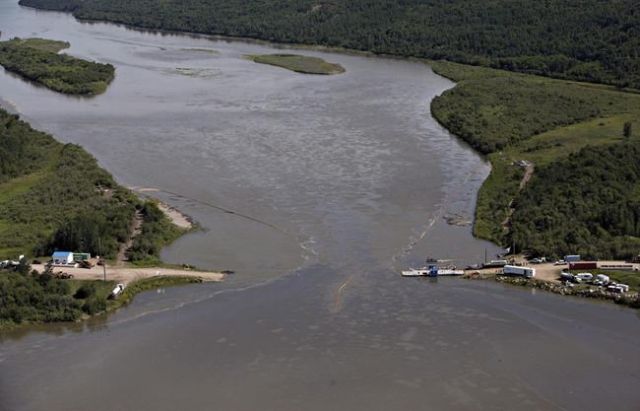
Husky Energy has pleaded guilty in a pipeline leak that sent oil spilling into a major river and fouled the source of drinking water for thousands of people.
The spill into the North Saskatchewan River in July 2016 forced the cities of North Battleford, Prince Albert and Melfort to shut off their water intakes for almost two months.
Calgary-based Husky entered guilty pleas on one provincial and two federal environmental charges in provincial court in Lloydminster, Sask.
The two federal charges under the Fisheries Act and the Migratory Birds Convention Act relate to the deposit of a harmful substance into water frequented by fish and birds.
The provincial conviction is for “allowing the discharge of a substance … into the environment” causing an adverse effect.
The federal Crown withdrew seven other charges.
About 40 per cent of 225,000 litres of diluted heavy oil from Husky’s pipeline near Maidstone in west-central Saskatchewan made it into the river.
It caused an oil plume that flowed hundreds of kilometres downstream.
The charges were announced in May 2018 after a 19-month joint federal-provincial investigation.
Husky had already apologized for the spill and said it accepted full responsibility. The company said the pipeline buckled and leaked because of ground movement.
The pipeline was allowed to restart in October 2016 after being repaired and inspected.
The company pegged the cleanup cost at more than $107 million. Husky said more than 90 per cent of the oil was recovered.
A victim impact statement filed Wednesday by three Indigenous communities in the area said the cleanup wasn’t good enough.
Chief Wayne Semaganis spoke on behalf of his Little Pine First Nation and also for the Sweetgrass and Red Pheasant bands.
He said birds, wildlife and fish such as walleye and northern pike still suffer the effects of the oil contamination. As a result, the First Nations have lost traditional use of their land.
“We no longer fish in the river. We no longer trap on or near reserve lands. We no longer farm on or near reserve lands,” he said.
“We no longer drink water drawn from reserve lands. In fact, many will only drink bottled water.”


